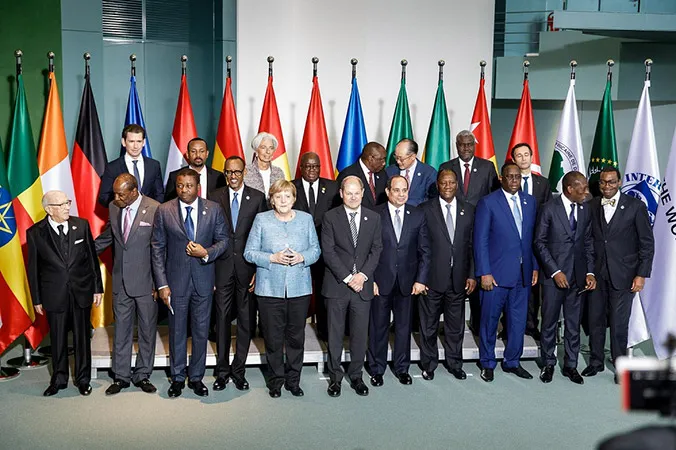
The emphasis on Africa, a hitherto marginalised region in G20 summits, was one of the most prominent features of Germany's G20 Presidency. Germany launched the Compact with Africa (CwA) initiative under the G20’s finance track in 2017. The main objective of the CwA initiative was to encourage private investment in Africa, particularly in the infrastructure sector, for high growth and job creation within Africa. Domestic pressures to stem migration from Africa also played an important role in the formulation of the CwA initiative. It was felt that creation of adequate economic opportunities for Africa’s youth within Africa would deter young Africans from seeking a better life in Europe.
Under CwA, African countries willing to join the initiative commit to an investment compact and engage with international organisations (World Bank, IMF, and AfDB) to discuss the initiative’s objectives and national priorities. Thereafter, the compact countries focus on reform measures and implementation. The three main reform areas under the CwA are as follows:
- Macro-economic environment for investment which covers economic policies in African countries to main macro-economic stability and ensure adequate infrastructure provision.
- Business environment which includes the general environment in which firms operate, regulatory practices and predictability, state capacity for management of public-private partnerships, project preparation etc.
- Financing environment for investors which includes development of local capital markets and support from long-term institutional investors in major financial systems.
So far only a handful of African countries: Benin, Burkina Faso, Cote d’Ivoire, Egypt, Ethiopia, Ghana, Guinea, Morocco, Rwanda, Senegal, Togo, and Tunisia have joined the initiative. According to a recent report by Rob Floyd, Kapil Kapoor and Laura Sennett, 101 commitments have already been made by nine participating African economies out of which 43%, 37%, and 21% were related to macro-economic stability, business and financial environment respectively. While 33% and 22% of the commitments under the macro-economic and business environment pillars were achieved only 5% of the commitments under financial environment has been achieved so far. Thus, one can say that there is some progress in reform process in the Compact countries but given the long-term nature of the reform process it is not clear to what extent the African countries will succeed in attracting private capital from these reforms. The following paras discuss some of the main issues with regard to the CwA and what the initiative holds for the African continent.
So far only a handful of African countries: Benin, Burkina Faso, Cote d’Ivoire, Egypt, Ethiopia, Ghana, Guinea, Morocco, Rwanda, Senegal, Togo, and Tunisia have joined the initiative.
One of the first questions that emerge with respect to this initiative is how invested are other G20 members in this initiative or is it just a German initiative? So far not many G20 countries have involved themselves deeply in the CwA initiative. Only Germany, France, United Kingdom, Japan, Canada, Spain, Netherlands, and the United States have participated in this initiative. In fact Katherine Keil argues that the CwA is more like a G7 initiative because apart from Spain and Netherlands, all other countries are a part of the G7. Many of the G20 members have their own programmes with Africa and may not be very keen to get closely involved in the CwA process. In fact, Chinese funding for African infrastructure exceeds the contributions of other countries and international organisations and comes without any additional conditionalities or reform requirements.
Secondly, although the initiative claims to be demand-driven, one of the major problems with the initiative is that it continues to look at Africa as a problem and adopts the age-old prescriptive approach to address development challenges in the continent. Currently, South Africa is the only African country which is a G20 member. Although the African Union and New Partnership for Africa's Development (NEPAD) attend G20 summits, the continent as a whole has little say in global development issues discussed at the G20. Under such circumstances, an initiative like CwA which essentially tries to facilitate reforms in African countries to boost private investment for higher growth and more jobs for Africans perpetuates the historical relationship that the continent always had with the West.
Thirdly, the initiative assumes that promoting private investment and development of physical infrastructure through domestic reforms is the panacea for all of Africa’s development challenges. There is little evidence to support this view though. In order to address poverty, inequality and youth unemployment in Africa, it is not only important that the continent attract private investors but also that such investments lead to the creation of decent jobs for Africans. The central question is - Will Africa profit from private industries or will the private sector profit at Africa’s expense? Africa’s development history suggests the latter is more likely without adequate safeguards. While African governments are committing to domestic reforms to attract the private sector, there is no guarantee that the private sector will meet environmental or social standards. What will be the role of G20 members and international organisations like the IMF and the World Bank? They will provide technical assistance, help in project preparation and encourage their private sector to invest in Compact countries. Unfortunately, the issues of fair wages, decent working conditions, environmental standards, sustainable development goals are completely absent from the CwA narrative. African governments will be responsible for ensuring these on their own. Moreover, overemphasis on the creation of physical infrastructure through public-private partnerships (PPPs) ignores the importance of social infrastructure like health and education which are essential for poverty alleviation and development.
Another key feature of the CwA initiative is that it reinforces the activities of the IMF and the World Bank. Directing private investment to the infrastructure sector has been the focus of these institutions for a long time. However, the fiscal, legal, regulatory, and institutional challenges with regard to PPPs have been completely neglected. PPPs often cost more in the long-run and expose governments to financial risks. In case of private financing of large infrastructure projects in immature financial markets, there are high risks that the private returns come at the expense of long-term fiscal costs. The CwA framework also includes business arbitration courts and Systemic Investor Response Mechanisms (SIRM) which often prioritise investor interests over public interest. In a nutshell, although launched with a lot of fanfare, the actual benefits for African countries from the initiative is still not clear and offers nothing new to African countries. In fact, the G20 members must realise that they would contribute more to Africa’s development by focusing the issues like fair trade practices, climate change, global financial architecture etc.
https://t20japan.org/policy-brief-g20-compact-with-africa/
https://us.boell.org/2017/12/13/g20-compact-africa-innovative-partnerships-or-business-usual
Ibid.
The views expressed above belong to the author(s). ORF research and analyses now available on Telegram! Click here to access our curated content — blogs, longforms and interviews.




 PREV
PREV


